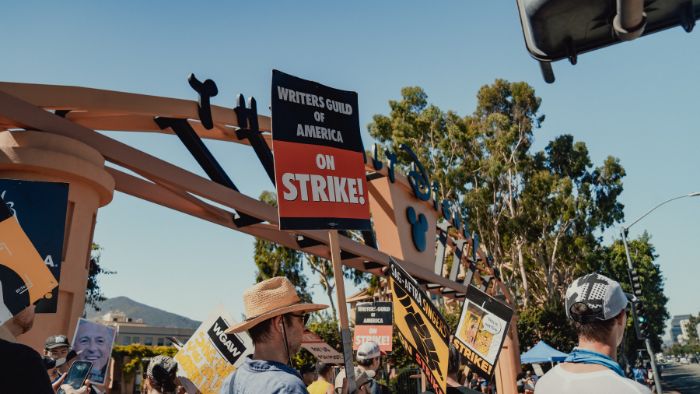Tuesday, May 2, defined the 2023 production year, stopping Hollywood’s schedule in its tracks. The Writer’s Guild of America (WGA) took a stand against the Alliance of Motion Picture and Television Producers (AMPTP) and went on strike, arguing for a comprehensive contract with fairer residual policies and protections against the growing artificial intelligence industry. Months later, the writers were joined by one of their counterparts, the Screen Actors Guild (SAG-AFTRA), on July 14. While the beginning of the writer’s strike threw a wrench in “For Your Consideration” season, SAG-AFTRA’s abruptly cut summer blockbuster promotion short, halting virtually every industry tangential to filmmaking. Both of the strikes lasted well until the fall, with the WGA strike ending on September 27 and the SAG-AFTRA strike closing on November 9.
A Look to the Past
The fight between Hollywood executives and creatives has persisted since the creation of the Screen Actors Guild and the Screen Writers Guild in 1933. While both guilds underwent various changes—becoming what we now know as the Screen Actors Guild and American Federation of Television and Radio Artists and the Writers Guild of America—each organization has undergone several strikes since. But, the last time two branches of Hollywood talent jointly went against the studios was in 1960, when the writers fought for pensions and television residuals and the actors fought for compensation from licensing deals. Most recently, the WGA went on strike from November 2007 to February 2008, echoing previous strikes’ concerns and seeking increased residual rates for DVD sales and streaming.
And in the aftermath of record inflation, COVID-19 and looming technological changes, it’s no wonder that the summer of 2023 saw two of these unions back on the picket lines for the first time in six decades.
The Demands
The 2023 joint strike came after a routine deliberation period between the AMPTP, WGA and SAG-AFTRA. Every three years, guild contracts are renegotiated to ensure members are compensated fairly, taking into consideration inflation and the standard of living, then adjusting based on these factors. For both writers and actors, 2023 negotiations focused heavily on improving the Minimum Basic Agreement and SAG-AFTRA basic agreement (MBA and CBA, respectively), improved residuals and protections against generative AI.
“Sure, there’s a couple stars at the top,” comedian and WGA contract negotiating committee member Adam Conover explains. “But, when you watch your television, 95 percent of [those actors] are trying to make a middle-class income. For the last five or ten years, that has not been possible because of the changes the companies made. Our wages have gone down while their budgets, revenues and profits have all gone up.”
In guild contracts, MBA and CBA guarantee that union talent get paid a minimum wage, have adequate access to health insurance and earn respectable streaming residuals. But, strikes ensue when the unions and the AMPTP can’t reach an agreement on what these basics entail.
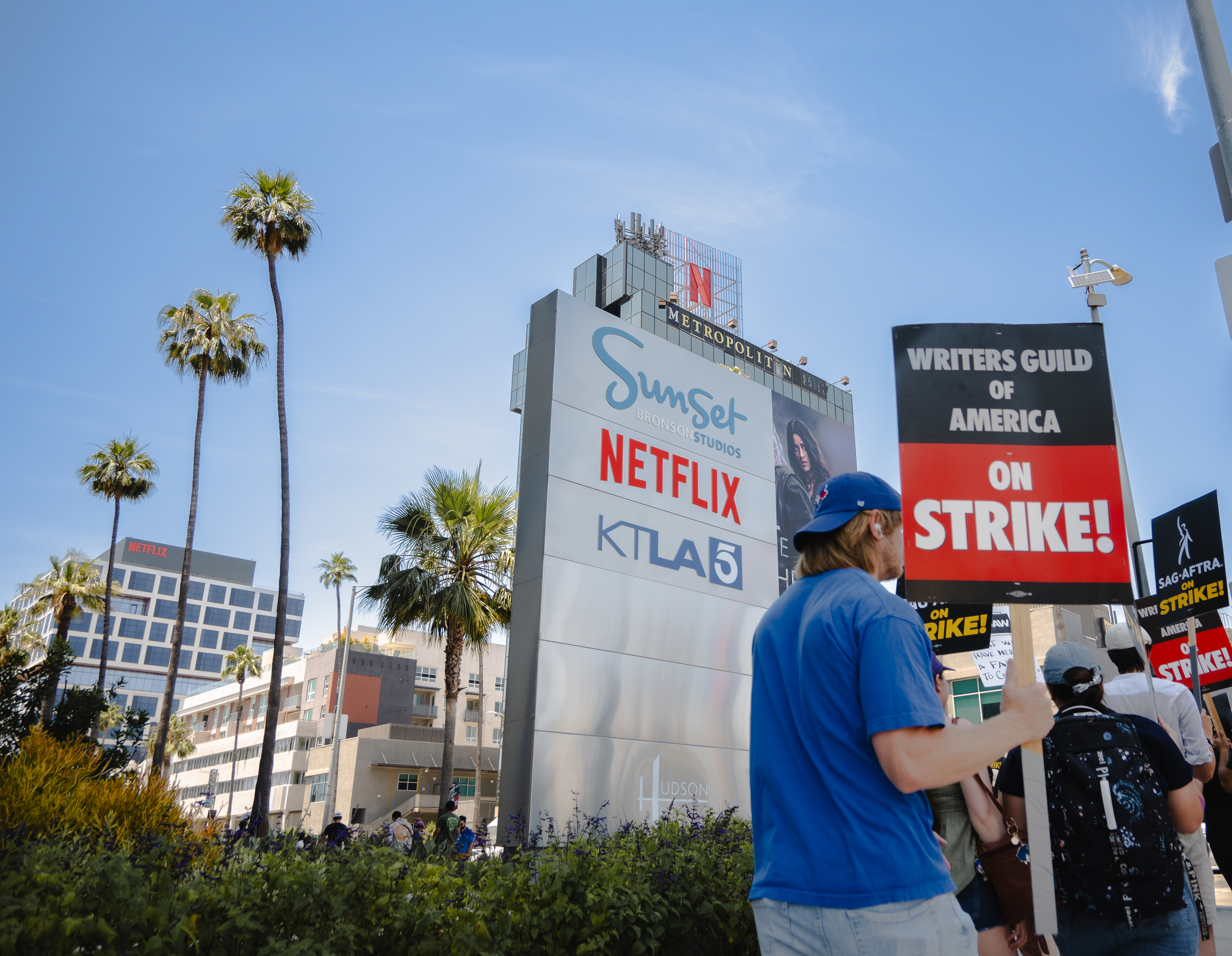
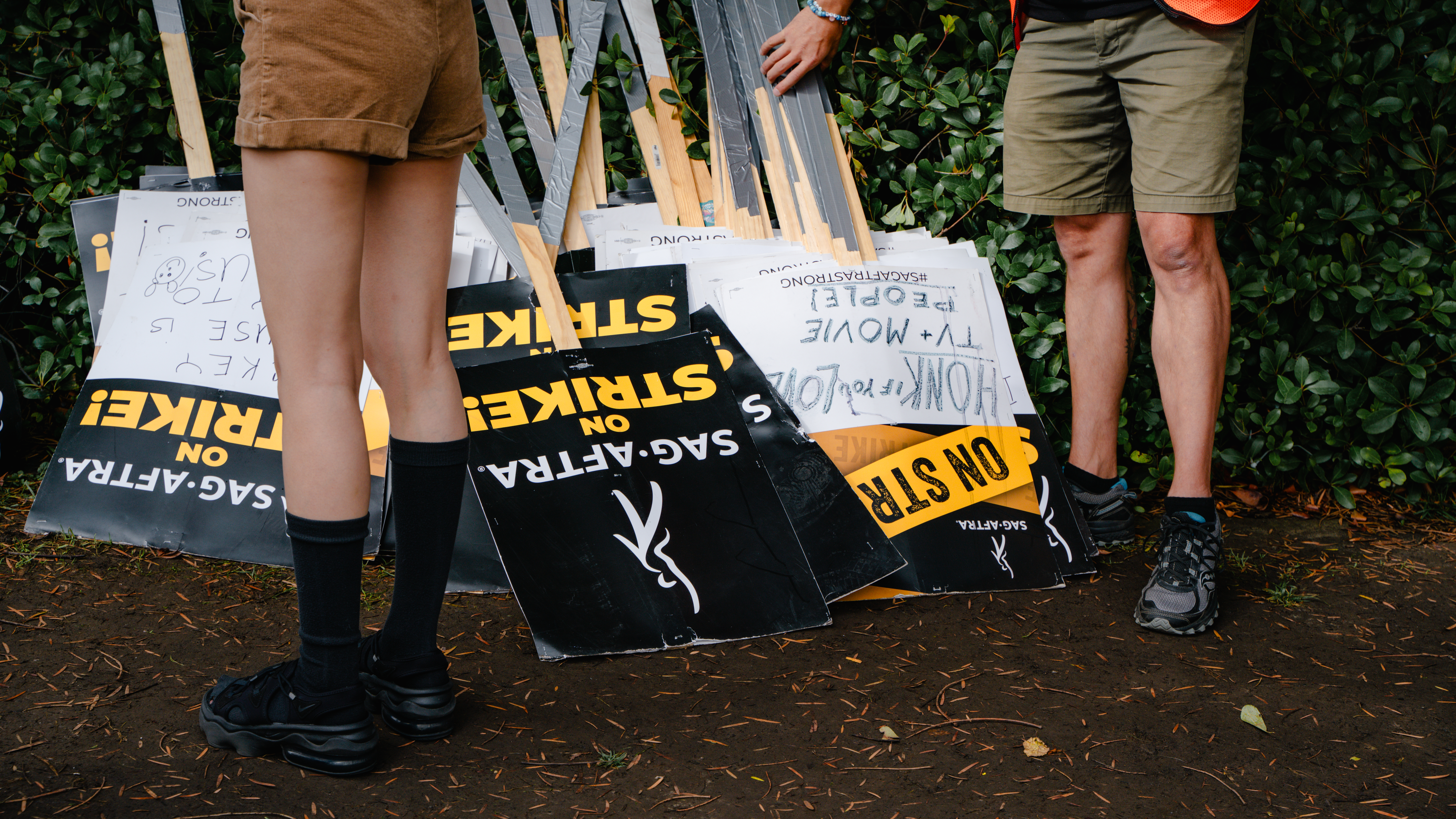
Beyond the reality that minimum wage has been decreasing for both film and TV laborers for the past decade or so, health insurance has also been elusive for many members of both guilds. In previous contracts, the threshold to qualify for health insurance was $26,470 in covered earnings for SAG-AFTRA and $41,773 in covered during a period of 4 or fewer quarters for WGA. Reaching this threshold has only been made more difficult by the appearance of streaming services in the last decade. Streamers rarely consider viewership numbers, as their profit comes from subscription fees—the argument being, how exactly would one determine what projects urged a user to subscribe? Instead, streamers opt for a fixed residual rate, a formula that takes into account the show or film’s runtime and how long it’s been on the platform. Popularity isn’t a part of the calculation, making it difficult for creatives to receive proper wages for even the most streamed series.
Adding to the 2023 strike docket was the growing fear that generative AI could undercut opportunities for writers and actors. For the WGA, the concern is that programs like ChatGPT could be utilized to pen virtually anything, with no expense to the production company. SAG-AFTRA’s situation is a bit more dystopian, explains Duncan Crabtree-Ireland, the Natural Executive Director and Chief Negotiator of SAG-AFTRA, at the press conference where the strike was announced. “They proposed that our background performers should be able to be scanned, get paid one day’s pay, and their company should own that scan—their likeness—and to be able to use it for the rest of eternity,” he says of the AMPTP’s original proposal.
The Affected
It’s no surprise then, that the WGA and SAG-AFTRA lined the blocks outside of studios like Warner Bros., Disney, Fox, Amazon and Sony, even in the blistering summer heat. The two guilds marched in tandem, holding signs that criticized the corporate greed that they believed caused a standstill to negotiations. “I think creatives in L.A. are some of the toughest people in this industry,” says “Once Upon A Time in Hollywood” actor Adrian Dev. “Nothing is going to make anyone cave until we get the contract that we want. Seeing residuals go from a livable wage to almost nothing—it’s insane. And you’re paying executives 250 million bonuses for no creative input on any of [these] projects.”
Singaporean non-union writer and director Ken Kwek is one of those tough creatives. “The strike didn’t come as a shock because for weeks I’d heard rumblings of it,” Kwek says. “I was disappointed that so many things had to be put on hold, but it was a necessary action to address long-festering issues.” In his own Medium article, Kwek outlines the sobering reality of trying to make a career out of screenwriting—documenting pay refusals breaches of signed contracts and multiple producer “ghostings.” “I’ve experienced what thousands of professional writers experience everywhere,” Kwek writes. In spite of having guilds to protect them, American writers and actors have been stiffed too, partly as a result of a culture where ‘earning one’s stripes’ means accepting exploitative practices and poorly-honored contracts.”
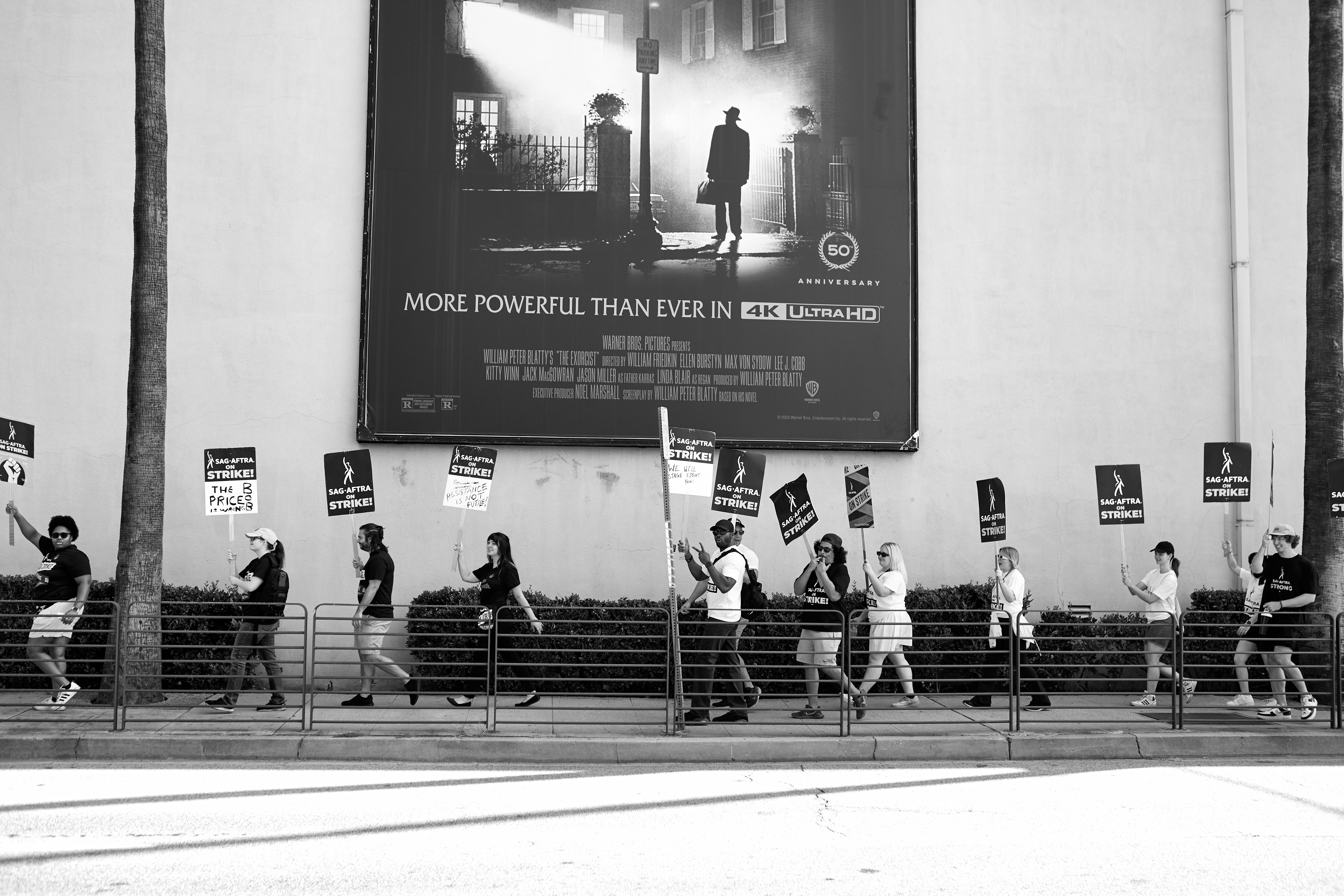
Anecdotes like Kwek’s are common, but acknowledgment is scarce when high-paid actors and writers are the ones in the limelight. The public typically hears not from the workers still “earning their stripes,” but rather, those who’ve found success. In truth, the majority are not making nearly as much as the Leonardo Dicaprio and Jesse Armstrongs, (writer of smash-hit, “Succession,”) of the world—much less a middle-class income. “Most of us in the union are jobbers. We’re not necessarily celebrities,” says SAG-AFTRA striker Jessica Ko. “I want to make sure that even if I [don’t] have a name, I’ll still be given a fair wage.”
As days turned into months, the joint strike took social media by storm, with these systemic issues taking center stage. In an interview that quickly went viral on Character Media’s TikTok, “BEEF” breakout star Young Mazino describes his experience, “I joined SAG-AFTRA in 2018 when I was struggling in New York — I lived off of residuals,” he says from the picket line. “The fact that streamers don’t have [adequate] residuals is crazy because that’s how a lot of actors are making a living. There has to be some kind of compensation.”
These kinds of viral strike videos and articles documenting the realities of being an actor or writer courted genpop support, whether that was shown through perpetual horn honking at strike locations, opinion pieces in prestigious publications or a simple like on TikTok, X (formerly known as Twitter) and Instagram. With this, as “The Good Place” actor Manny Jacinto put it, “righteous fire,” lit beneath the two guilds, it’s easy to see how they refused to buckle, even with pressure from the AMPTP.
Community Comes Together
The general public’s support was vital. Still, it was WGA and SAG-AFTRA’s durability throughout the months on the picket line came from the interior — writers and actors motivating each other to stand strong and keep pushing forward. When scouring the strike locations, workers of all creeds draped the sidewalks and held up signs side-by-side, and the Asian Pacific Islander (API) community was no exception. “Brooklyn Nine-Nine” and “NCIS: Los Angeles” actor James Tang puts what he’s learned while picketing poignantly, “There’s so much unity in this town.”
“13 Reasons Why” actor Michele Selene Ang explains, “I’ve learned there’s more solidarity [in L.A.] than I originally thought. LA can be a very lonely place, but I’ve learned you have to make your own energy. And there’s no better energy than the one I’ve found on the picket line this summer with [these] writers and actors.”
For the API community, the MAX series “Warrior“— based on Bruce Lee’s original treatment—held a picketing event with cast, crew and fans at Disney Studios late in the summer, sharing dim sum and playing music to bolster everyone up after months of difficulty on the picket line. While holding mini boxes of dumplings, strikers marched in front of Disney’s doors, only stopping to listen to speeches from fellow attendees. Seasoned “CSI: Vegas” actor Michael Sun Lee gave his two cents: “Been in the business about 20 years. I would like to see things become more fair and equitable for our striking brothers and sisters. For me, too. But it’s a long game.”
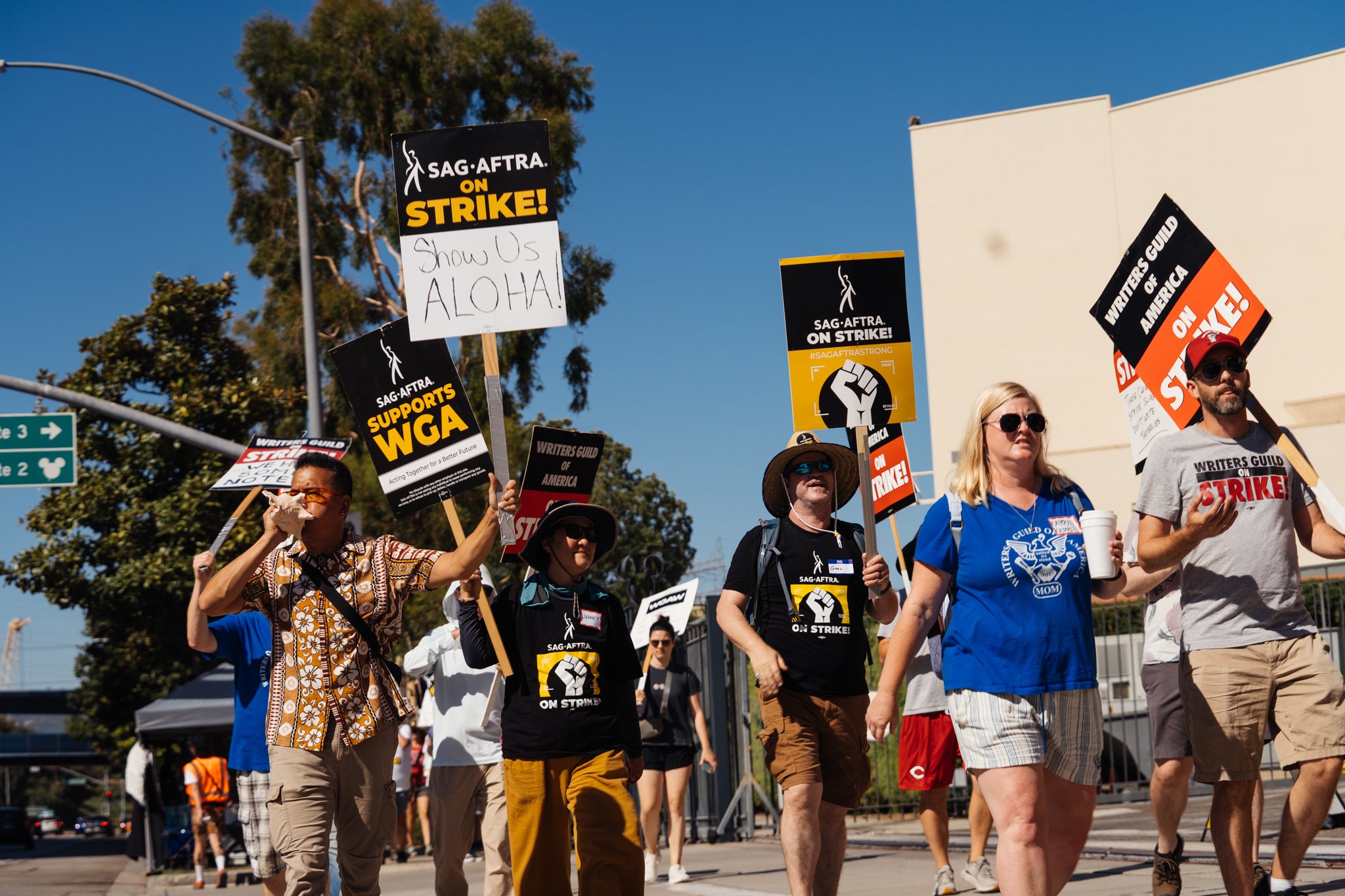
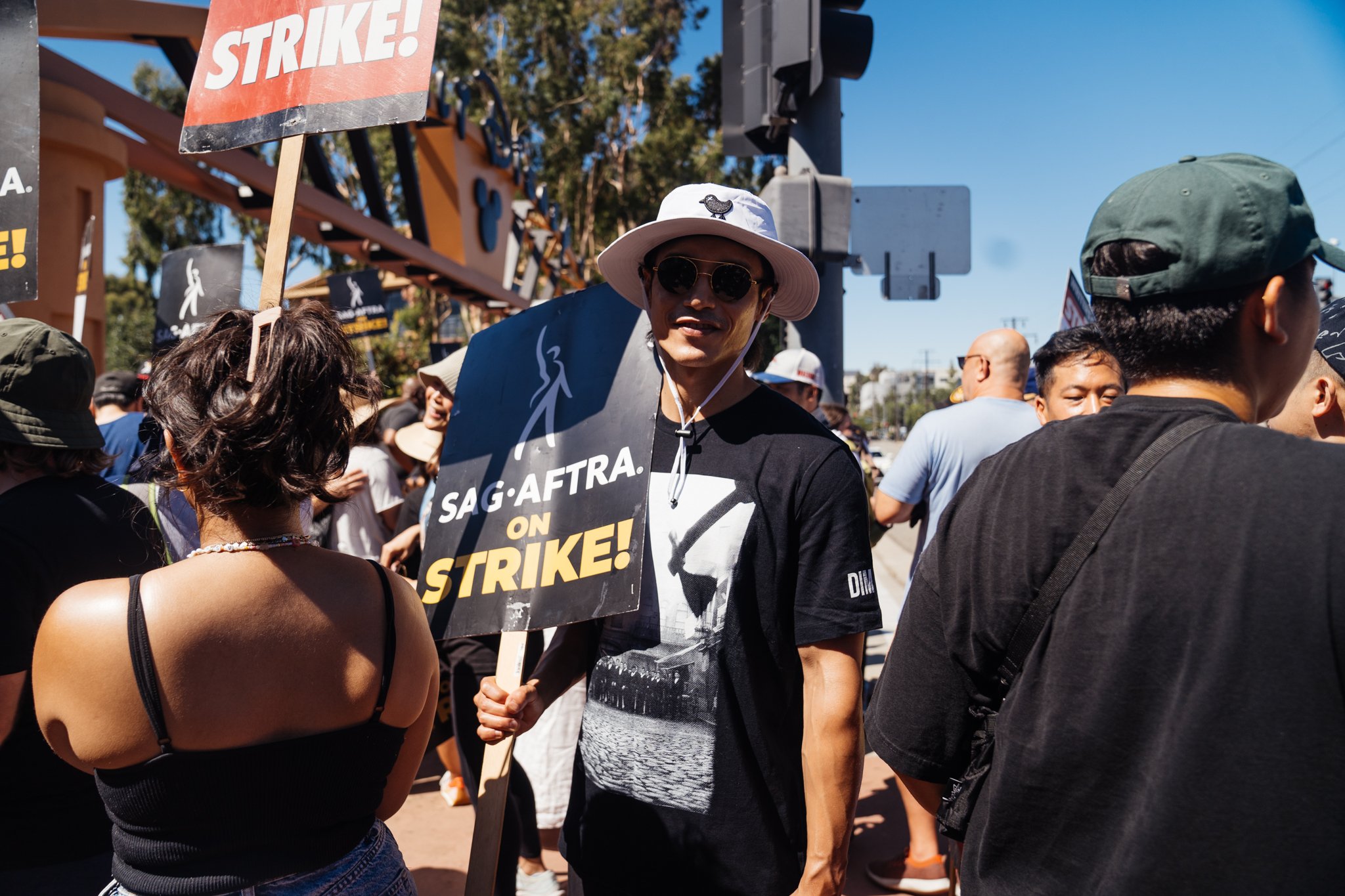
It’s the dedication of vets like Lee that has brought API artists to a point where they can fill studios’ sidewalks in droves, demanding a fairer wage. And it’s the API community’s now-flowering representation that makes the strike bittersweet. “The Asian American community has really been affected,” says actor Eugene Cordero at another API strike gathering. “I feel like in the last few years, we’ve really started to stand up. There’s movies like “Joy Ride,” “Crazy Rich Asians” and “Everything Everywhere All At Once“—all of these movies are giving us a voice. And we have to put it on pause because people aren’t listening or giving us fair wages.”
Primetime Emmy winner Rain Valdez puts it all in perspective, the loss, the struggle and what a better future could look like. “There’s solidarity and high emotions at. But at the same time, there’s collective grief that we’ve been having to deal with as artists,” she says outside of Warner Brothers Studios. “Because the one thing we’re all very passionate about has been taken away; But, it’s a very important strike and has to happen. We’re all doing it together, and we won’t stop until we get what we ask for.”
Valdez doesn’t only imagine a brighter future in the context of a fairer contract, but also in terms of intersectionality. “As a transgender woman and actor we’re kind of always on the bottom of the totem pole when it comes to opportunities,” she explains. “When the strike hit, it became so much harder because before, [the strike], opportunities were already very scarce for my community.” Rather than see this as a setback, Valdez believes the air of the strike affords a new kind of opportunity.
“Now that we’re here, [we’re] lifting the veil. All of the issues that we’ve been having to deal with as a community—[the strike] has opened the doors to more conversation. We’re all in this union together, but even the African American community are on the lower of the totem pole when it comes to opportunity—the trans community as well. How are we supporting each other? How are we intersecting these conversations through community lines so that when we do get back there’s a fair amount of opportunities for us all?” she asks. “That’s my big hope. That’s why I show up when I can.”
Deals
“I think the power of the people will always win,” says Joy Ride actor Sherry Cola back in July. Almost five months into the strike, her words rang true. On September 26, the WGA leadership board voted to end the strike, encouraging members to vote in favor of the agreement they reached with the AMPTP a few days prior. On October 9, the contract was formally ratified by 99% of WGA members, promising MBA increases of 5%, 4% and 3.5% annually for the next 3 years, streaming residual bonuses based on viewership and sturdy protections against AI. With these gains, the writers metaphorically wrapped up their picketing, though many stayed on the strike lines to fight for their counterparts in SAG-AFTRA.
Following the WGA’s success, SAG-AFTRA negotiations resumed on October 2, with picketing actors expressing mixed feelings about returning to the table. Actor Pae Pae from “L.A. Proper” (2007) moved with hopefulness.“I’m very hopeful — I think that without the writers we wouldn’t be here right now because they spoke up and were the the front runners of all of this. I’m excited to see what comes of [the SAG-AFTRA negotiations] and hopefully we won’t have that many more talks,” she said. “This [conversation] will be one of the biggest and the most impactful. We may actually nip it in the bud a lot sooner.”
Others, like “Remittance” star Law Sharma, made room for all outcomes, “[The WGA] fought for a lot of things that they needed, and they got it. I think that sets an expectation that whatever we need we’re gonna be able to attain,” he says. “It’s hopeful, but everyone’s cautiously optimistic about the situation because you don’t know how things are gonna work. And the work doesn’t stop even if we meet a deal. [The strike] is so unprecedented that it started a huge conversation of what it means to be part of a union and treated fairly.”
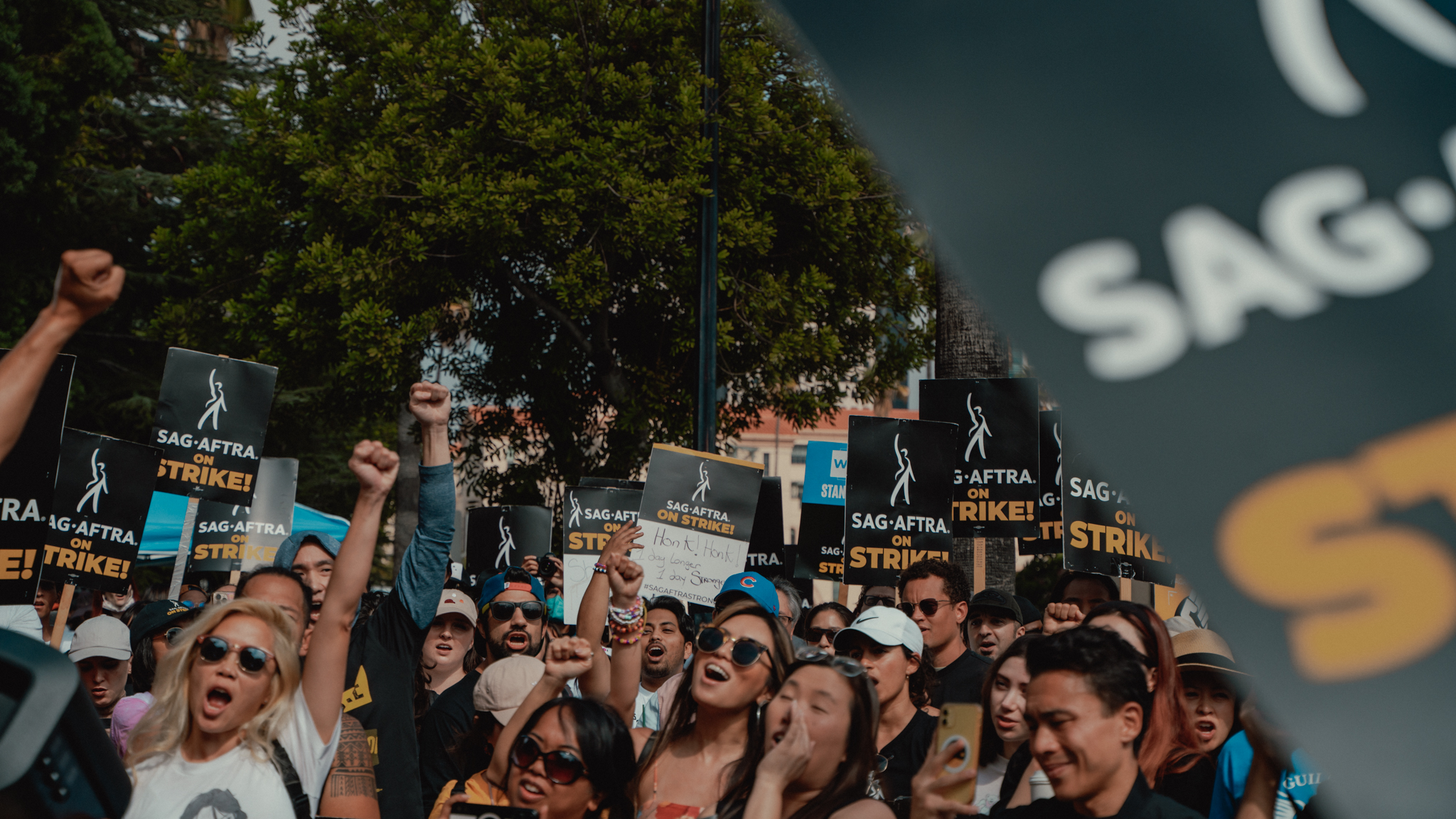
On November 9, SAG-AFTRA and the AMPTP came to a tentative agreement, effectively ending the actors’ strike. Under their new contract, actors with speaking roles will receive wage hikes by 7%, 4% and 3.5% between 2023 and 2025, with background actors receiving an 11%, 4% and 3.5% increase. Similarly to the WGA’s, the new SAG-AFTRA contract bases streaming residuals on viewership, ensuring that streaming success translates into a monetary one.
As for measures to protect actors from AI, agreements are more tentative. Although the deal specifies that studios must get an actor’s informed consent before having their likeness captured and pay them a day rate and applicable residuals, the verbiage in the new contract seems to leave room for loopholes—i.e. studios must give a “reasonably specific description” for using a “digital double.” What defines “reasonable”? Additionally, the new AI rules state that studios must get an actor’s informed consent except “when the photography or soundtrack remains substantially as scripted, performed and/or recorded.” What defines “substantially”?
Only time will tell how these AI measures will pan out for the actors of 2023 and beyond. Nonetheless, SAG-AFTRA and WGA can finally take a breath and get back to doing the work they love. Evident by the barrage of social media posts that flooded feeds after the actors’ strike concluded—see any “Warrior” cast member’s Instagram—writers and their acting compatriots celebrate the projects they couldn’t discuss during the 6 months on the picket line, and rear up to move forward.
Onward to 2024.
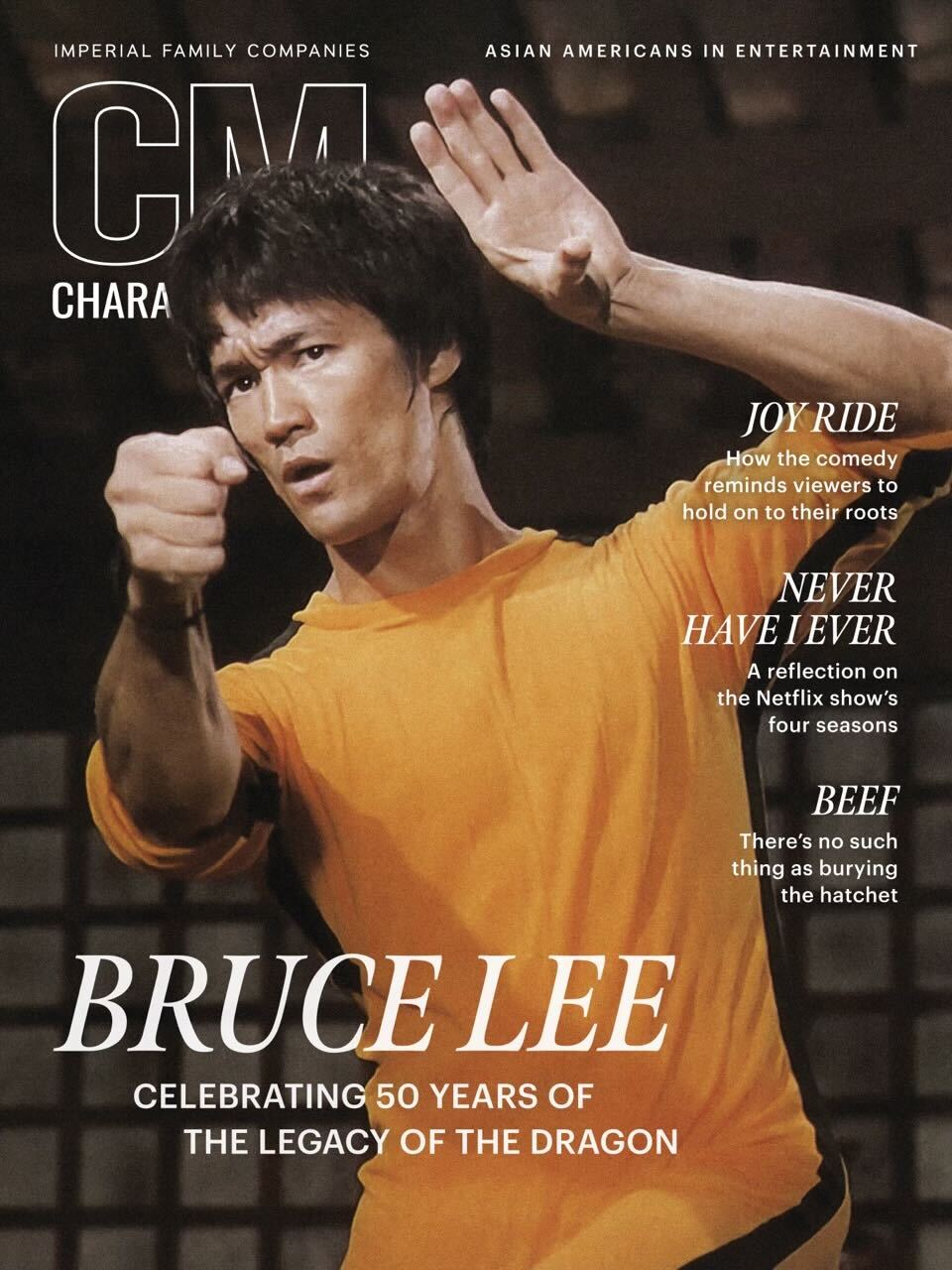
This article appeared in Character Media’s Annual 2023 Issue.
Read our full e-magazine here.



